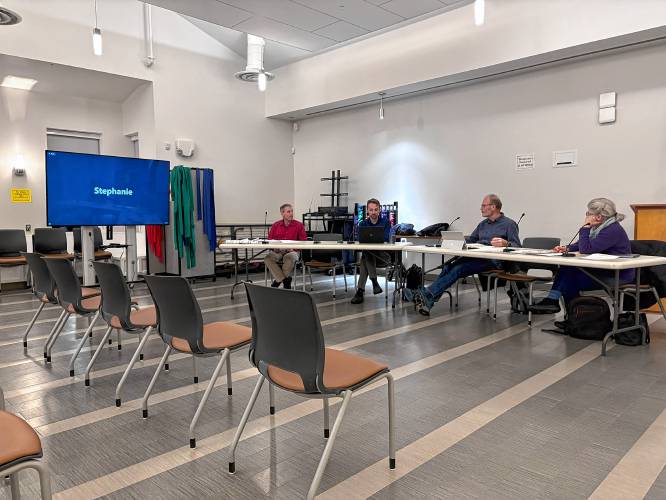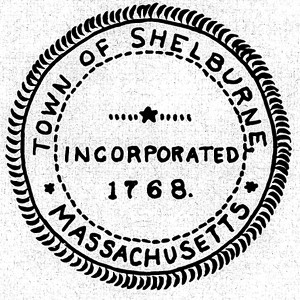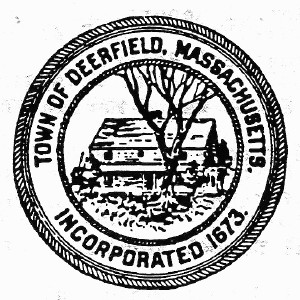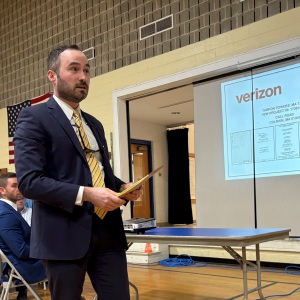Greenfield Planning Board discusses regs for ground-floor cannabis dispensaries downtown

The Greenfield Planning Board meets at the John Zon Community Center on Thursday. STAFF PHOTO/ANTHONY CAMMALLERI
| Published: 02-14-2025 5:04 PM |
GREENFIELD — The Planning Board discussed potentially drafting guidelines regulating street-facing, ground-floor cannabis dispensaries on Thursday, with some members asserting that the state’s mandate that cannabis businesses have opaque or obscured windows makes their presence a form of “blight” on downtown Greenfield.
“I actually find it very offensive, personally, because I think a vibrant downtown has activity at the street level. You see in and there’s a sense of life in there, and you feel like you’re part of that, either people on the inside looking out and seeing you engaging,” Planning Board alternate Erica Rioux Gees said. “It’s not really good for a vibrant downtown and an active, livable street.”
The topic arose when Planning Board Clerk Victor Moschella mentioned the approval of a site plan for a mixed-use housing development with a ground-floor retail cannabis store at its Dec. 11 meeting.
The board approved the project in December under the condition that the 220-228 Main St. retail space’s windows on the ground floor be completely transparent — a design element that Greenfield Planning Director Eric Twarog noted will likely be reconsidered in the event that the proposed dispensary’s special permit application makes its way to the Zoning Board of Appeals, since state Cannabis Control Commission regulations require marijuana retailers to obscure their store rooms using tinted, opaque or translucent windows.
Moschella, at Thursday night’s meeting, noted that some storefronts in Greenfield have a “shadow box” front display with a black wall behind a display window — a design that he argued is more aesthetically pleasing than a frosted or opaque storefront window.
In response, Rioux Gees argued that obscured windows of any kind on Main Street made the area look “blighted.” When she asked whether the Planning Board could place design guidelines to require cannabis dispensaries to face the rear exits of buildings, Twarog explained that currently, cannabis dispensaries are allowed anywhere in the city’s Central Commercial District with no additional restrictions on their placements within buildings.
“It’s up to this board to come up with those recommendations,” Moschella said. “If the board wants to make a recommendation to City Council that there are no street-side dispensaries on Main Street, we can make that recommendation.”
Although the board did not place discussion of the proposed guidelines on the agenda for its March 6 meeting, members generally agreed that design guidelines for downtown dispensaries is a topic worth looking into.
Article continues after...
Yesterday's Most Read Articles
 Local ‘Hands Off!’ standouts planned as part of national effort
Local ‘Hands Off!’ standouts planned as part of national effort
 Shelburne Selectboard determines police detective will retain job
Shelburne Selectboard determines police detective will retain job
 Local libraries react to state funding cuts, federal administrative leave
Local libraries react to state funding cuts, federal administrative leave
 Incandescent Brewing now open in Bernardston
Incandescent Brewing now open in Bernardston
 Cooking up an expansion: Cocina Lupita eyes second location in Turners Falls
Cooking up an expansion: Cocina Lupita eyes second location in Turners Falls
 ‘She is our future’: Thirty years after permitting women to join, Montague Elks is almost entirely women-led
‘She is our future’: Thirty years after permitting women to join, Montague Elks is almost entirely women-led
The board also voted in favor of recommending amendments to the city’s accessory dwelling unit ordinance to bring it into compliance with the Affordable Homes Act, which protects the by-right construction of ADUs in single-family zoning districts throughout the state. The law took effect Feb. 2.
Although a group of residents strongly urged the board to include requirements for a legal notice and notification to abutters in its ADU ordinance, the Planning Board agreed to not include this stipulation, under the argument that it would unnecessarily violate a property owner’s privacy.
“It’s a burden to issue the legal notifications — that belongs in the special permit category, not the site plan review, and I’ve seen this in other communities. It’s a violation of privacy,” Planning Board alternate Thomas Bledsoe said. “People within 300 feet who didn’t even know your name now see that you’re doing something that might be kind of personal in your house. They have a floor plan of your house. They know where all your rooms are, and you get accosted at the grocery store now if you’re doing something, so it politicizes something that you’re allowed to do on your private property by right. It just isn’t the business of the public.”
Anthony Cammalleri can be reached at acammalleri@recorder.com or 413-930-4429.






 New panel to review senior housing proposals in Deerfield
New panel to review senior housing proposals in Deerfield Shutesbury reviewing how to improve safety on Lake Wyola in wake of accident last summer
Shutesbury reviewing how to improve safety on Lake Wyola in wake of accident last summer Colrain zoning board approves variance for Call Road cell tower
Colrain zoning board approves variance for Call Road cell tower
